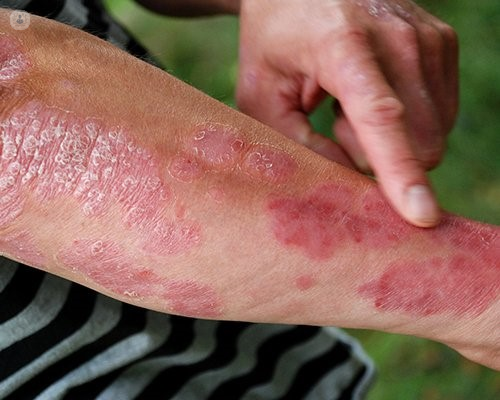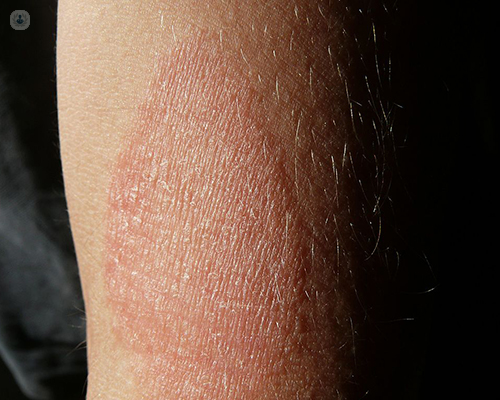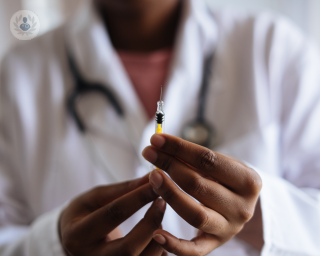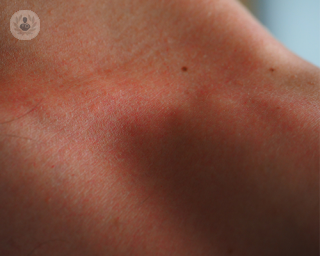Rash
Dr Lea Solman - Paediatric dermatology
Created on: 11-13-2012
Updated on: 05-03-2023
Edited by: Conor Lynch
What is a rash?
A rash is an area of redness and widespread eruption of skin lesions, usually appearing as a result of an irritation or illness. There are various types of rashes, which are distinguished based on the colour, texture and cause.

What are the most common types of rash?
There are quite a few different types of rash, but the most common types are:
- Contact dermatitis: this appears as a red, itchy skin reaction caused by direct contact with a substance or product (soaps, or materials such as latex or rubber).
- Seborrheic dermatitis: a harmless rash that often affects the scalp. It causes reddened areas, scaling and dandruff. This condition is usually caused by stress or the use of lotions or soaps that contain alcohol.
What is the prognosis?
The prognosis depends on the type and cause of the rash. Sometimes, a rash can be contagious, so special care must be taken not to pass it to other areas of the body or to other people.
What are the main associated symptoms?
The main symptom of a rash is itching accompanied by reddish welts. Rashes can be located in a specific part of the body or throughout the skin, and causes the skin to become warm, dry, inflamed, or can even sometimes cause blisters.
How is a rash diagnosed?
There are simple, routine tests that are commonly used diagnose a rash and to determine what is causing it. The most common ways of diagnosing a rash include:
- physical exam
- blood test
- allergy test
- skin biopsy
What causes a rash?
The causes can be varied. Some of the most common causes include:
- clothing such as latex or rubber products
- cosmetics products including soaps and detergents
- allergic reactions
It is important to stress here that many diseases can also cause skin rashes, and these rashes may share a very similar appearance. The most common diseases or medical conditions that cause skin rashes include chickenpox or measles, herpes zoster virus, psoriasis, eczema, insect bites, or reactions to certain medications.
Can rashes be prevented? If so, how?
Rashes can indeed be prevented. Prevention is aimed at avoiding substances that can irritate the skin. There are also some basic skincare tips you can follow to help prevent a rash appearing. These include the following:
- avoid rubbing the skin with force
- use special soaps designed for sensitive skin
- use warm water to clean areas that may be most affected
- avoid using strong chemical cleaning products
- follow proper personal hygiene
How is a rash treated?
The treatment for skin rashes depends on the cause, but typically ranges from cortisone creams to oral medications. Therefore, it is necessary to identify all of the symptoms and possible triggers to reduce the irritation and effectively treat it.

Which specialist diagnoses and treats rashes?
The specialist who diagnoses and treats rashes is a dermatologist.
Are skin rashes always an early sign of skin cancer?
No, not necessarily. Not all kinds of skin cancer cause skin rashes, and they can simply be caused by other non-skin related medical conditions, and, as previously mentioned, various soaps and various different allergic reactions.
What types of skin cancer may cause a skin rash?
Some types of skin cancer, such as melanoma, do not lead to a skin rash. One of the main early warning signs of basal cell carcinoma, however, is, more often than not, a scaly, pink patch on one's skin that gradually develops a shiny appearance over time.
Can other types of cancer cause skin rashes?
It is not a very common occurrence, but, yes, indeed they can. Cancers such as leukaemia, kaposi sarcoma, mycosis fungoides, and sezary syndrome, can all lead to the development and appearance of a skin rash.
What is the main indication that my skin rash may mean cancer?
Non-cancerous skin rashes resolve on their own and eventually go away without the need for treatment. Cancerous skin rashes, on the other hand, do not resolve on their own, and get worse over time if left untreated and undiagnosed.
















